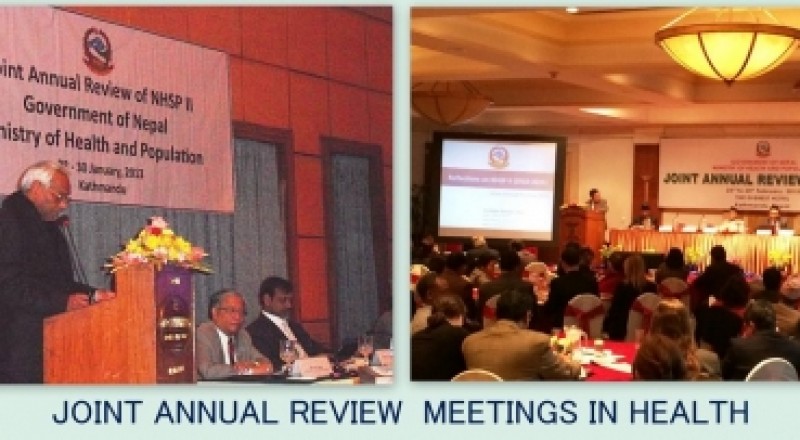The Joint Annual Review (JAR) meeting is organized every year by the Ministry of Health (MoH) with participation by various line agencies of the Government of Nepal (GoN), External Development Partners (EDPs), civil society organizations and other state and non-state actors. MoH prepares a number of reports as outlined in the Joint Financing Arrangement (JFA) and these reports form the basis for the discussions during the JAR. This was widely seen as a success as it provided a platform to share different activities and allowed the plenary discussions to be focused on reviewing the performance of the past and defining priorities for the forthcoming Annual Work-plan and Budget (AWPB). JAR is an integral part of Sector Wide Approach (SWAp), and provides an opportunity for GoN, EDPs and civil society to jointly review progress made each year and the way forward through an open dialogue and discussion model.
The two major principles are:
- Every action of this Aide-mémoire has been agreed jointly between the EDPs and MoH.
- Both parties will jointly work to achieve these actions and the aide-mémoire will be a public document.
JAR 2015
The JAR 2015 reflected on NHSP (Nepal Health Sector Programme) II 2010-15 implementation focusing on key achievements, challenges and existing opportunities to be capitalized upon in moving forward to the NHSP period. The previous NHSP period saw improvements in service delivery and health outcomes with significant progress on maternal and child health. Progress was also made in areas of financial management in terms of introduction of Transaction Accounting and Budget Control System (TABUCS) to record and capture expenditures at cost centers, update health management information system to report disaggregated data on service utilization. It saw better mainstreaming of gender and social inclusion in health.
Partnership remained the cornerstone of health development during NHSP period. Strengthened partnership allowed rapid scale up of proven initiatives like Aama Programme and Community Based Integrated Management of Neonatal and Childhood Illness (CB-IMNCI). It has also increased multi-sectoral response in health with frameworks already being established in areas such as nutrition, sanitation and hygiene.
However, despite through improved access and utilization of health services, disparities still exist among certain population sub-groups and ecological zones. Looking forward to the future, quality of care remains one of the core challenges for health. It also faces many monitoring and evaluation problems and has difficulties in information management.
One of the major components of JAR involves financial management. It is concerned with development and implementation of TABUCS, strengthening of MoHP, internal control system and development and introduction of systems to reduce the proportion of audit queries against audited expenditure. It is further concerned with effective and efficient procurement, logistics and asset management. It involves activities oriented towards strengthening social health security. Effective Human Resource management remains an important challenge for the government to tackle. From production to deployment to retention, all aspects of human resource management pose a challenge. The JAR recognizes the overall arena of development cooperation in the health sector as progression and acceptance of the SWAp as an effective mechanism to harness the partnership in the health sector. Furthermore, the JAR has applauded MoH’s recent initiatives to promote multi sectoral response to address health issues and social determinants of health.
Agreed Actions of JAR 2015
The following were the Agreed Actions of JAR 2015:
- MoHP will form a task force with representatives from NHSP III programme development team and other nominated representatives from GoN and EDPs
- MoHP and EDPs will begin discussions on disbursement-linked indicators based on financial modality
- Draft of National Public Health Act will be prepared
- State, non-state partnership policy will be revised in line with the national Health Policy 2014 and endorsed by the end of September 2015
- EDPs to indicate budget support and commitments for fiscal year 2015/2016 before March 2015
- Identify the required number of human resource positions to be furnished through local contracts for implementing different programs and specify in NHSP III document
- Update financial management improvement plans jointly with MoHP, MoF, NPC, FGCO and EDPs to identify systematic issues and actions to be taken over
- Submission of OAG external audit report for fiscal year 2013/2014
- Practice of redistribution of rugs and commodities will be initiated in 3 districts from each region to minimize stock outs and over stock situation
- Adjust timeline and provide adequate funding for the first year implementation of procurement and supply chain management
- Staffing of physical asset management section under management division to ensure temporary recruitment and permanent staffing
- Roll out new national health care waste management guidelines in 1000 public and selected private health facilities
- Increase budget and enhance capacity of regional health directories for implementation and monitoring of public health activities and hold them responsible and accountable for programs in their regions effectively
- Comprehensive assessment initiated and short-term plan prepared to manage overcrowding of maternity wards in referral to hospitals to ensure quality of care for safe and respectful delivery.
The report of Joint Annual Review Meeting 2015 can be downloaded from here.
JAR 2016 is being organized on March 15 and 16 at Hotel Yak and Yeti, Kathmandu.



Comments(0)
No comments found.